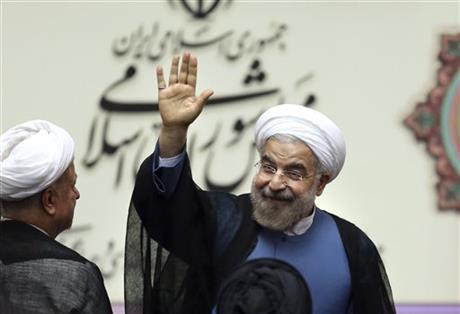
Iran’s new President Hasan Rouhani, waves after swearing in at the parliament, in Tehran, Iran, Sunday, Aug. 4, 2013. Iran’s new president on Sunday called on the West to abandon the “language of sanctions” in dealing with his country over its contentious nuclear program, hoping to ease the economic pressures now grinding its people. Rouhani spoke after being sworn in as president in an open session of parliament Sunday, capping a weekend that saw him endorsed by Ayatollah Ali Khamenei, Iran’s supreme leader. (AP Photo/Ebrahim Noroozi)
TEHRAN, Iran (AP) — Iran’s new president has appointed a prominent reformist as his top deputy, state TV reported Monday, his most prominent pick as he tries to fill out a government balanced between the reformists who helped secure his election and the conservatives who still have tremendous influence in the running of the country.
Hasan Rouhani named Eshaq Jahangiri, a former industry and mines minister, as First Vice President, the broadcast said. Jahangiri is a close ally of former reformist president Mohammed Khatami, who is disliked by hard-liners.
Iran has several vice presidents, but Jahangiri would be first in line of succession of anything were to happen to Rouhani.
Rouhani, who was primarily supported by reformists and centrists but who pledged to form a non-factional government, has also proposed several conservatives for his Cabinet.
Rouhani won a landslide victory in June presidential elections. He took the oath of office Sunday and sent his proposed Cabinet list to the parliament for a vote of confidence.
Also Monday, Supreme Leader Ali Khamenei appointed former president Mahmoud Ahmadinejad to an advisory body.
In a decree announced on state TV, Khamenei appointed Ahmadinejad as a member of the Expediency Council, a body that advises the top leader on state matters. The council is headed by former powerful president Akbar Hashemi Rafsanjani, a bitter enemy of Ahmadinejad.
Ahmadinejad lost the support of clerical hard-liners when he was perceived to challenge Khamenei in 2011, causing his political influence to drop dramatically. He remains popular with some Iranians, however. It is not clear what if any political role he will play in the future.



